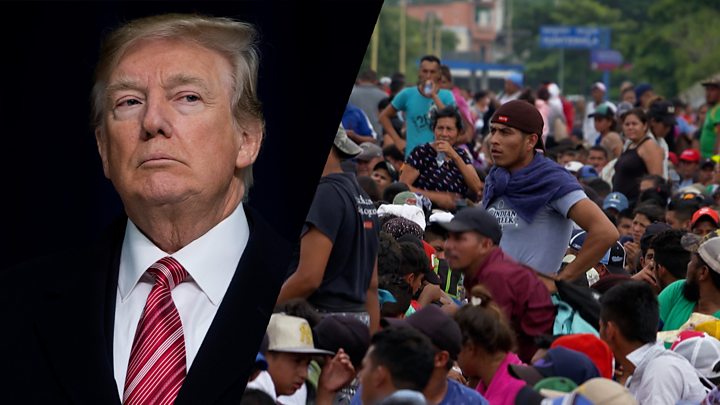
The Central American caravan that is dolefully approaching the northern border of our country is the most recent chapter in the poverty that holds back progress in Latin America. The fact that this impressive migration can be understood through its sponsorship by the most extreme left wings of Honduras, El Salvador and Guatemala takes away neither its importance nor its meaning.
Even if the mystery of who is providing support to the two migrant caravans – which, on television, appears to show the majority of people not in rags but reasonably dressed – is solved, the fact is that those who suffer on this very long march are not affiliated with any resistance movement and consequently lack support.
The challenge that this long walk of hope puts before us is not easy to resolve. The march reinforces Donald Trump’s argument that uncontrolled migration is a danger, which in turn, has led to his response of militarizing the southern border and completely denying entry to people who lack legal permission to enter the U.S.
This issue is really a maneuver by a number of groups: those against predatory capitalism and those that oppose the inefficient governments responsible for poverty and lack of education, while at the same time, it is a confirmation of the importance and the true power of grassroots movements that, without offering viable and immediate solutions to its complaints, specialize in setting traps for the authorities.
The caravan brings to our door the drama that we have seen on television from the Italian coast, the borders of Germany, Spain and Hungary, and the extraordinary tragedies of Syria and Yemen. We find ourselves out of necessity, not just obligation, responding with solidarity and compassion that we ourselves have demanded for all these years from the authorities and the people of the United States, for our emigrants.
Fortunately, the generosity of hundreds of Mexican families all along the roads on the caravan route is once again proving the vitality of the Mexican spirit to help the defenseless. The spirit of social organization, both national and international, and churches, with admirable acts of charity and official efforts, are exemplary.
The government plans to organize the human surge by documenting, to the degree possible, the migratory status of each individual. The possibility of requesting asylum in Mexico is available, as well as the official admission procedure of finding work, even if it is temporary, as President-elect Lopez Obrador has stated. With this option, we can incorporate into our economy hundreds of Central American immigrants, first to our country and then into our small and medium enterprises.
Mexico has much experience in dealing with Central Americans who have fled violence of all kinds, from both the mafias and the military regimes. The southern states of Mexico have already hosted thousands of refugees and because of that, fortunately, we can rely on the existing framework to duplicate solidarity programs with a capacity similar to previous efforts. Therefore, these programs can be restarted in a minimum of time.
The problem of what to do in the face of the reality of thousands of Latin American brothers who arrive needing help and support is not just ours. The fact that those who are marching want to enter the United States makes it essential for the United States to share with us the financial implications of the programs that are required. It is the task of the incoming government of Mexico to negotiate with Donald Trump for the equitable distribution of the obligation, making it clear that the intensity and immediacy of the problem is the fault of the intransigence of American migratory policy.
Now is the time to make relations between Mexico and United States ever closer, despite the discordance emanating from the Oval Office, to prompt attention to the migratory question that is now before us as a regional issue. Our historic association with the countries of the isthmus would benefit from our northern neighbor providing resources, rather than scorn, to the work of socio-economic development which is clearly the task that needs to be carried out.
The drama of world poverty is increasing. Instead of utilizing harassment and distancing himself from supportive solutions, the president of the United States should make another shift in his policy and focus it toward the prosperity, not just of his country, but of the entire region, the poverty of which gave rise to the hard-pressed caravans.

Leave a Reply
You must be logged in to post a comment.